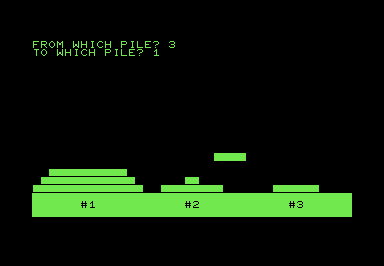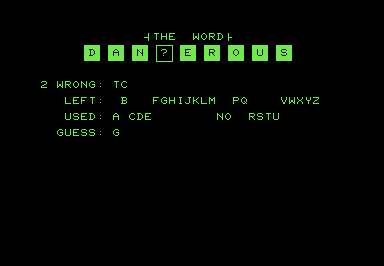CURSOR #5 – November/December 1978

COVER
Author: Uncredited
Original file name: COVER05
PRG file: cover05.prg
This month's cover is interactive. A grid of circles represents the keyboard; pressing any key causes one of the circles to light up. On Vice 3.8, I've been able to register up to six keys pressed at any one time. I'd be interested in seeing how this compares to the behaviour of the real hardware because I know that on the 64, even some three-key combinations will not decode correctly. Although the flyer describes the cover display as a "matrix", it is not related to the actual keyboard matrix that the PET uses to decode keyboard input signals (diagram by Larry Kraemer).
Pressing SPACE takes you to the table of contents for the issue.

HANOI
Author: Glen Fisher
Original file name: HANOI
PRG file: hanoi.prg
HANOI is an implementation of the
Towers of Hanoi puzzle,
whose optimal solution is commonly used to teach Computer Science students about recursion.
This version features PETSCII animation, with blocky "disks" floating from one pile to another.
The animation is smooth but very slow. If you want to solve the full 7-disk puzzle, expect to be
sitting at the keyboard for a while.

SHOOT
Author: Gary Bainbridge
Original file name: SHOOT
PRG file: shoot.prg
SHOOT is a simple timing and reflex game. A PETSCII cross drops from the top
of the screen, and you have to press a key at just the right moment to time your shot. I thought
at first that you had to try and lead the target, but actually, you're just trying to stop
the falling target at the moment it passes the height of the barrel of your gun. Hitting the
target results in the
tamest
explosion ever.
You set the speed of the falling target by choosing 1 of 5 levels. Timing at the fastest speed is tricky; I only managed to score 2/10 even after a bit of practice.

BSHIP
Author: Howard Arrington
Original file name: BSHIP
PRG file: bship.prg
BSHIP is an implementation of the classic board game
Battleship that
lets you play against a computer opponent. The computer is no slouch, either—expect a tough
match. This version adds an additional wrinkle in that you fire a volley of shots, and the computer
reports how many of them were successful, and which ship they hit, but leaves the results ambiguous
enough that you will have to employ a bit of deductive reasoning to locate your quarry.
Sometimes the computer can be slow taking its turn, so it would be nice if there was some visual indication that it is considering its next moves. The first time there was a delay, I thought maybe the program had crashed. Aside from a bit of slowness, this is a solid version of Battleship.

FACE
Author: Glen Fisher
Original file name: FACE
PRG file: face.prg
FACE is a little software toy where you can have the PET generate some random PETSCII
faces, or you can select eyebrows, eyes, noses, and mouths from a series of menus and make your
own face. The program reminds me a bit of later programs like Commodore's
Home Babysitter or
Facemaker from Spinnaker.
This program has a limited scope, because there is only a small selection of random elements to choose from. Even so, as a kid, I probably would have played around this one for a while, because there is always the possibility of hitting STOP and adding new features to the BASIC program listing.

HMAN
Author: Glen Fisher
Original file name: HMAN
PRG file: hman.prg
HMAN is a version of the word game Hangman "without the gallows". I remember
playing a Hangman game (in French!) with a PETSCII drawing of a little stick figure rendered piece
by piece as the game progressed, so I feel like Fisher is taking the lazy way out here.
Even so, the display is clean, and the game plays well. The word list is challenging, with enough
variety to encourage replay, and it's easy to add additional words to the program. Of course,
because HMAN is written in BASIC, and there's no attempt to disguise the dictionary,
you can always
sneak a peek at the game's vocabulary
to improve your guessing strategies.
